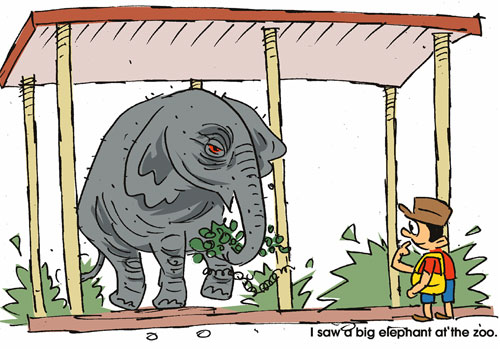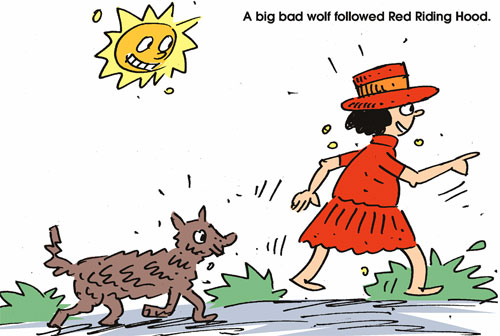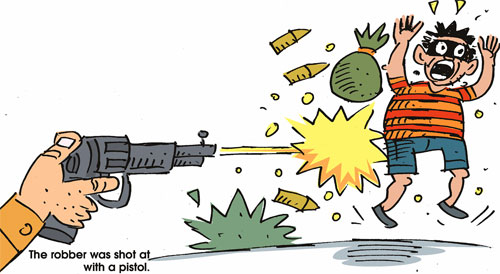|
 by R. S. Karunaratne
by R. S. Karunaratne
The use of adjectives
[Part 1]
An adjective is a word that describes a noun.
The children crossed the main road.
Chess is an indoor game.
The only problem is I’ve no money to buy a camera.

Benjamin is the former Professor of Mathematics.
It was a dark night.
An adjective is usually placed before a noun.
Amanda is wearing a long skirt.
We can’t go out in this cold weather.
Are you interested in classical music.
Grandfather wants to sell his old car.
Solar power is cheap and eco-friendly.
An adjective is used after ‘be, become, get, seem, look’ and ‘feel.’
The water is cold.
Jeniffer looks happy.
I feel hot.
He is getting late.
You seem tired.
After ‘be, become, get, seem, look and feel’, we put ‘and’ before the
last of the two or more adjectives.
Bradpit is tall, dark and handsome.
You look happy and contented.
Janitha is a friendly and cultured woman.
He seems a bright and intelligent boy.
The beggar looks hungry and weak.
Adjectives do not change for singular and plural.
My brother drives a new car.
People like to drive new cars.
I saw a big elephant at the zoo.
We saw big elephants at the Yala Sanctuary.
Shameer is a tall man.
All his sons are tall boys.
Before nouns we do not usually put ‘and’ between adjectives.
A big bad wolf followed Red Riding Hood.
A short dark man sat at the counter.
A beautiful little girl received the first prize.
We sat under a tall green tree.
Mary has bright white teeth.
We use colour adjectives after other adjectives.
Nalin was reading a small green book.
Mother bought a big red apple.
Sharmila wore a beautiful white sari.
A big black dog bit the stranger.
He always wears an old black coat.
We can use ‘very’ or ‘quite’ before an adjective.
My grandmother is very old.
Your essay is very good.
My house is quite new.
Your car is quite old!
You’re quite right!

Certain adjectives can be used only in one position.
Be careful when you cross the main road.
The only problem is I’m busy today.
The former President is back in politics.
Do you like indoor games?
Children love outdoor activities.
Some adjectives can only be used after a linking verb.
At last the child is asleep.
Jayamini’s two daughters are very alike.
I’m pleased to meet you.
Romesh looked ill.
I’m afraid, she is not in her seat.
[Activity]
Put in the adjectives and write the story. Check your answers with
the key.
One day, a time ago, (long, fine) a girl (beautiful, little) in a
coat (red) was walking through a forest (dark) with a bag (big) of
apples (red, wonderful) to see her grandmother (old). Under a tree
(tall, green) she saw a wolf (big, bad) with teeth (white, long).
Key:
One fine day a long time ago, a beautiful little girl in a red coat
was walking through a dark forest with a big bag of wonderful red apples
to see her old grandmother. Under a tall green tree she saw a big bad
wolf with long white teeth.
Match words and meanings
Match the words in Column ‘A’ with their meanings in Column ‘B.’
Write the letter of the meaning in the space provided. Check your
answers with the key.
Column A Column B
....... 1. Angelic A. confidence and style
....... 2. Angst B. a place where bees are kept
....... 3. Animate C. the highest point
....... 4. Animosity D. showing no interest or energy
....... 5. Annals E. worried and nervous
....... 6. Annihilate F. the exact opposite
....... 7. Annoy G. old-fashioned
....... 8. Annual H. strong dislike
....... 9. Antagonism I. funny behaviour
....... 10. Antedate J. like a human being
....... 11. Anthropoid K. predate
....... 12. Antics L. hate
....... 13. Antipathy M. happening once every year
....... 14. Antiquated N. to make somebody angry
........ 15. Antithesis O. to destroy completely
........ 16. Anxious P. historical records
........ 17. Apathetic Q. strong dislike
........ 18. Apex R. having life
........ 19. Apiary S. strong worry and unhappiness
........ 20. Aplomb T. very beautiful
Key:
1. T
2. S
3. R
4. Q
5. P
6. O
7. N
8. M
9. L
10. K
11. J 1
12. I
13. H
14. G
15. F
16. E
17. D
18. C
19. B
20. A
Starters:
How to use prepositions
[Part 25]
There are over 100 prepositions in English.This is a very small
number compared with the vast number of nouns, verbs and adjectives.
However, most beginners find it difficult to use prepositions correctly.
Here is a guide for them.
[Via]

The prepositions ‘via’ means ‘through.’
The Colombo - Australia flight goes via Malaysia.
A lot of people send letters via e-mail.
We had a transit visa to Paris via Madrid.
‘Via’ also means ‘using.’
Weather reports are coming via satellite.
The owners of the abandoned lands can be traced via the Land Registry.
I got the books you sent via my aunt.
[With]
‘With’ is a very useful preposition. It is used to indicate the
presence of a person or thing.
I was not afraid because I was with my friends.
Shyama lives with her grandmother.
Some people are impossible to work with.
I went to India with a group of tourists.
Madhuri Dixit starred with Khan in many Hindi films.
Do you like fruit salad with ice-cream?
She said, “I’ll be with you in a moment.”
There is a paying guest living with my parents.
Rex has been with the accounts department for a very long time.
We use ‘with’ to indicate the method of doing something.
The robber was shot at with a pistol.
She wiped her tears with a handkerchief.
You can put up a house with the help of a bank loan.
Some verbs are typically followed by ‘with’:
ally, amalgamate, associate, chat, coexist, cohabit, collaborate,
collide, confer, conspire, dance, debate, discuss, fraternise, interact,
merge, negotiate, share, socialise, speak, trade, work, argue, bargain,
clash, compete, disagree, feud, fight, haggle, quarrel, row, spar,
struggle, vie, wrangle
We can do something with a tool or substance.
The robber broke the widow glass with a hammer.
The cat lapped up the milk with its tongue.
‘With’ can be used to describe something.
I met an old woman with grey hair.
He left college with no qualifications.
Benedict works for a company with branches in many countries.
I want a cup of coffee with milk.
William arrived in Colombo with nothing but the clothes he was wearing.
Yesterday I woke up with a dreadful headache.
With a bit of luck, you can pass the examination.
I graduated with a degree in Mass Communication.
We use ‘with’ in certain phrases.
With best wishes from all at home.
With love from Sandhya.
If you go somewhere with something, you carry it.
Grandfather went out with a walking stick.
Mother returned home with a bag of sweets.
If you are with an illness, you have it.
A child with a temperature was brought to the hospital.
Malkanthi is in bed with ‘flu.
You can cover something with a substance.
The walls of my house are covered with bookshelves.
[Activity]
Fill in the blanks with suitable prepositions. Check your answers
with the key.
1. Doreen seemed preoccupied .......... her own thoughts.
2. Strikes are the products of the society ......... which we live.
3. Russian art was closely related ........... social and political
change.
4. Why aren’t they sending a replacement ............ Almeida?
5. Most countries rely ........... nuclear energy.
6. If you cannot cooperate .......... the new management, you can leave.
7. The Government should counter the opposition propaganda .......... a
series of public meetings.
8. Do you know that feathers are essential .......... a bird?
9. After coming home I made an entry ........ my diary.
10. These coupons can be exchanged .......... goods.
Key:
1. with 2. in 3. to 4. for 5. on 6. with 7. with 8. to 9. in 10. for
Form adjectives from nouns
Words often come in families. You can expand your vocabulary by
becoming familiar with these word families. In the following quiz we
give 25 nouns in Column ‘A’. Fill in Column ‘B’ with the relevant
adjectives and check your answers with the key.
Column A Column B
1. Storm ............
2. Stranger ............
3. Strength ............
4. Stress ............
5. Strike ............
6. Structure ............
7. Study ............
8. Stupidity ............
9. Style ............
10. Substance ............
11. Success ............
12. Suddenness ............
13. Sufferance ............
14. Suggestion ............
15. Support ............
16. Supposition ............
17. Surface ............
18. Surprise ............
19. Surroundings ............
20. Survival ............
21. Suspicion ............
22. Swearing ............
23. Sweetness ............
24. Symbol ............
25. Sympathy ............
Key:
1. stormy
2. strange
3. strong
4. stressful
5. striking
6. structural
7. studious
8. stupid
9. stylish
10. substantial
11. successful
12. sudden
13. insufferable
14. suggestive
15. supportive
16. supposed
17. surface
18. surprised
19. surrounding
20. surviving
21. suspicious
22. sworn
23. sweet
24. symbolic
25. sympathetic |


